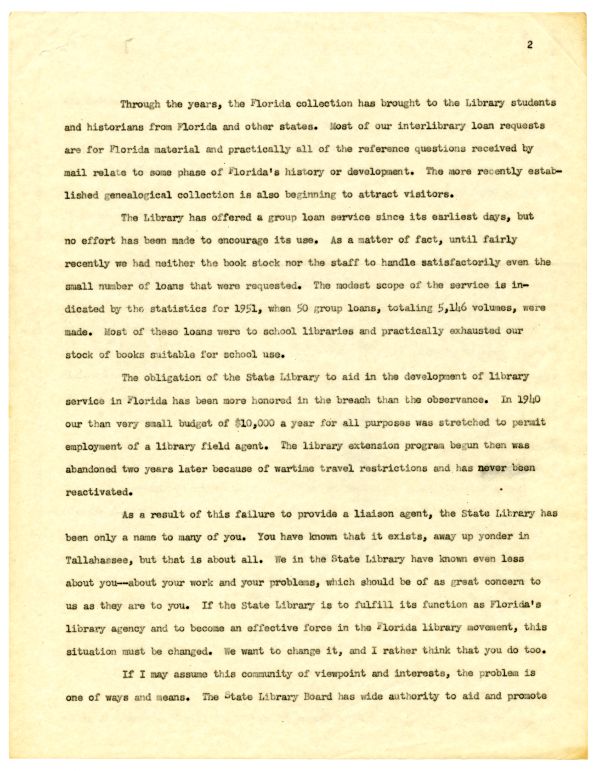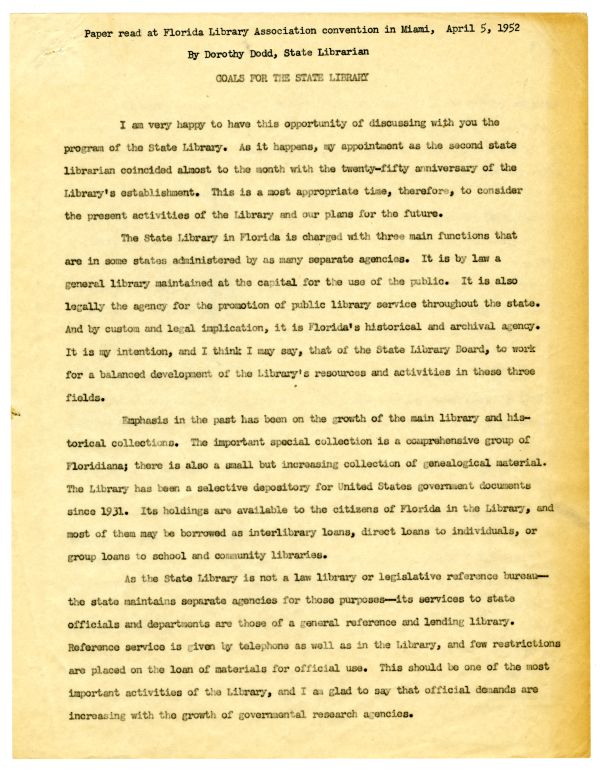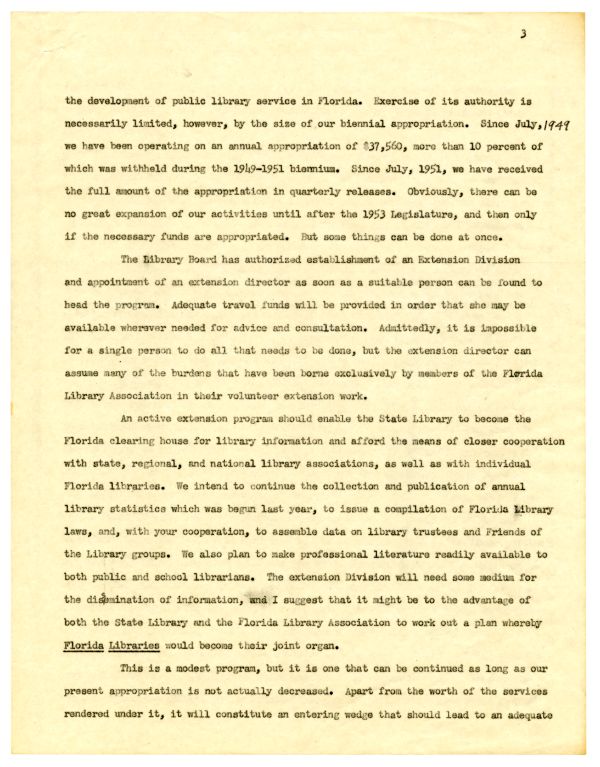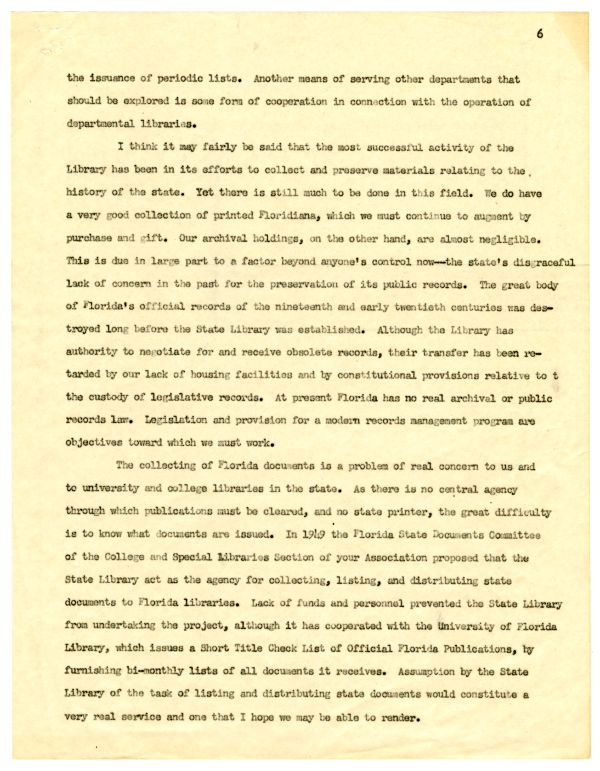Transcript
Paper read at Florida Library Association convention in Miami, April 5, 1952
By Dorothy Dodd, State Librarian
GOALS FOR THE STATE LIBRARY
I am very happy to have this opportunity of discussing with you the program of the State Library. As it happens, my appointment as the second state librarian coincided almost to the month with twenty-[fifth] anniversary of the Library's establishment. This is a most appropriate time, therefore, to consider the present activities of the Library and our plans for the future.
The State Library in Florida is charged with three main functions that are in some states administered by as many separate agencies. It is by law a general library maintained at the capital for the use of the public. It is also legally the agency for the promotion of public library service throughout the state. And by custom and legal implication, it is Florida's historical and archival agency. It is my intention, and I think I may say, that the State Library Board, to work for a balanced development of the Library's resources and activities in these three fields.
Emphasis in the past has been on the growth of the main library and historical collections. The important special collection is a comprehensive group of Floridiana; there is also a small but increasing collection of genealogical material. The Library has been a selective depository for United States government documents since 1931. Its holdings are available to the citizens of Florida in the Library, and most of them may be borrowed as interlibrary loans, direct loans to individuals, or group loans to school and community libraries.
As the State Library is not a law library or legislative reference bureau--the state maintains separate agencies for those purposes--its services to state officials and departments are those of a general reference and lending library. Reference service is given by telephone as well as in the Library, and few restrictions are placed on the loan of materials for official use. This should be one of the most important activities of the Library, and I am glad to say that official demands are increasing with the growth of governmental research agencies.
2
Through the years, the Florida collection has brought to the Library students and historians from Florida and other states. Most of our interlibrary loan requests are for Florida material and practically all of the reference questions received by mail relate to some phase of Florida's history or development. The more recently established genealogical collection is also beginning to attract visitors.
The Library has offered a group loan service since its earliest days, but no effort has been made to encourage its use. As a matter of fact, until fairly recently we had neither the book stock nor the staff to handle satisfactorily even the small number of loans that were requested. The modest scope of the service is indicated by the statistics for 1951, when 50 group loans, totaling 5,146 volumes, were made. Most of these loans were to school libraries and practically exhausted our stock of books suitable for school use.
The obligation of the State Library to aid in the development of library service in Florida has been more honored in the breach than the observance. In 1940 our [then] very small budget of $10,000 a year for all purposes was stretched to permit employment of a library field agent. The library extension program begun then was abandoned two years later because of wartime travel restrictions and has never been reactivated.
As a result of this failure to provide a liaison, agent, the State Library has been only a name to many of you. You have known that it exists, away up yonder in Tallahassee, but that is about all. We in the State Library have known even less about you--about your work and your problems, which should be of as great concern to us as they are to you. If the State Library is to fulfill its function as Florida's library agency and to become an effective force in the Florida library movement, this situation must be changed. We went to change it, and I rather think that you do too.
If I may assume this community of viewpoint and interests, the problem is one of ways and means. The State Library Board has wide authority to aid and promote
3
the development of public library service in Florida. Exercise of its authority is necessarily limited, however, by the size of our biennial appropriation. Since July, 1949 we have been operating on an annual appropriation of $37,560, more than 10 percent of which was withheld during the 1949-1951 biennium. Since July, 1951, we have received the full amount of the appropriation in quarterly releases. Obviously, there can be no great expansion of our activities until after the 1953 Legislature, and then only if the necessary funds are appropriated. But some things can be done at once.
The Library Board has authorized establishment of an Extension Division and appointment of an extension director as soon as a suitable person can be found to head the program. Adequate travel funds will be provided in order than she may be available wherever needed for advice and consultation. Admittedly, it is impossible for a single person to do all that needs to be done, but the extension director can assume many of the burdens that have been borne exclusively by members of the Florida Library Association in their volunteer extension work.
An active extension program should enable the State Library to become the Florida clearing house for library information and afford the means of closer cooperation with state, regional, and national library associations, as well as with individual Florida libraries. We intend to continue the collection and publication of annual library statistics which was begun last year, to issue a compilation of Florida Library laws, and, with your cooperation, to assemble data on library trustees and Friends of the Library groups. We also plan to make professional literature readily available to both public and school librarians. The extension Division will need some medium for the dissemination of information, and I suggest that it might be the advantage of both the State Library and the Florida Library Association to work out a plan whereby Florida Libraries would become their joint organ.
This is a modest program, but it is one that can be continued as long as our present appropriation is not actually decreased. Apart from the worth of the services rendered under it, it will constitute an entering wedge that should lead to an adequate
4
appropriation for the work. The very fact that it is operating will counter the reluctance shown by the State Budget Commission in former years to recommend money for a new service.
Passage of the Library Services Bill, now pending in Congress, could have a very important effect on our extension program. As you know, the bill is designed to aid states in expanding library service in rural areas. Florida would be eligible for an initial allotment of $40,000, plus $93,130 on the basis of its rural population, or a total of $133,130. These moneys would be alloted on a matching basis. To secure the entire amount, we would have to furnish $94,442. That is two and a half times our present budget, and little if any of what we are now spending could be counted as matching funds. The immediate advantage to us of passage of the bill would be its provision of a powerful talking point for a matching state appropriation. Letters to your Senators and Representatives in support of the bill would be helpful at this time.
Much more important than possible Federal aid is a strong and continuing legislative program here in Florida. The Florida Library Association has taken the lead in formulating such a program. Self-interest, if nothing else, should lead the State Library to support that program in principle, since it calls for an increased appropriation for the State Library, revision of the county library law to permit easy organization of county and regional libraries, and a state aid fund, administered by the State Library, for the expansion and equalization of library opportunities throughout the state. The bill sponsored by the Association in 1951 combined revision of the county library law with a formula for the distribution of state aid funds. It is my belief that the two objectives should be the subjects of separate legislation. A workable county library law would be a big gain even if the State itself never put up a penny for libraries. To tie it to the more controversial state-aid proposal is to run a serious risk of delaying its enactment. I am also inclined to think that the proposed bases for [distribution] of state aid should be reexamined with a view to incorporating in the formula an equalization principle. That, of course, would involve
5
establishment of absolute and per capita minimum funds requisite for effective operation of a county of multi-county library.
All of the proposed legislation involves, either directly or indirectly, the expenditure of public moneys. This means that, no matter how socially desirable the program is, it must compete for financial support with numerous other agencies and interest groups whose requests are equally as valid. It is not enough that the state librarian and the State Library Board are convinced of its worth and express that conviction forcibly to the Budget Commission and Legislature. We will be regarded as, and are in a sense, special pleaders and interested parties. Success of the program will depend on the demonstration of a genuine public demand for the contemplated service. The Florida Library Association has already indicated by its actions its recognition of this fact. In the future, the State Library will endeavor to carrys its full share of the responsibility.
Although the improvement of public library service is a long-neglected function of the State Library which deserves and will receive immediate attention, the other services and facilities of the Library should be strengthened and expanded. In fact, if our extension program is to be more than an advisory service, the Library's general book stock must be greatly increased. We now have estimated holdsing of some 35,000 volumes, including government documents, from which to supply supplemental materials to local libraries and direct book loans to individuals and groups in communities without well organized libraries. That is pitifully little with which to render the kind of lending service we want, and should be expected, to give.
In addition to increasing our stock of books for extension loans, we also have the obligation of providing materials that will be primarily of interest and use to state officials and departments. I see no reason why the key personnel of state research divisions should not stand in somewhat the same relation to the State Library that professors do to a university or college library. We should consult them as to the kinds of books [they] need in their work and inform them of new acquisitions through
6
the issuance of periodic lists. Another means of serving other departments that should be explored is some form of cooperation in connection with the operation of departmental libraries.
I think it may fairly be said that the most successful activity of the Library has been in its efforts to collect and preserve materials relating to the history of the state. Yet there is still much to be done in this field. We do have a very good collection of printed Floridiana, which we must continue to augment by purchase and gift. Our archival holdings, on the other hand, are almost negligible. This is due in large part to a factor beyond anyone's control now--that state's disgraceful lack of concern in the past for the preservation of its public records. The great body of Florida's official records of the nineteenth and early twentieth centuries was destroyed long before the State Library was established. Although the Library has authority to negotiate for and receive obsolete records, their transfer has been retarded by our lack of housing facilities and by constitutional provisions relative to [the] custody of legislative records. At present Florida has no real archival or public records law. Legislation and provision for a modern records management program are objectives toward which we must work.
The collecting of Florida documents is a problem of real concern to us and to university and college libraries in the state. As there is no central agency through which publications must be cleared, and no state printer, the great difficulty is to know what documents are issued. In 1949 the Florida State Documents Committee of the College and Special Libraries Section of your Association proposed that the State Library act as the agency for collecting, listing, and distributing state documents to Florida libraries. Lack of funds and personnel prevented the State Library from undertaking the project, although it has cooperated with the University of Florida Library, which issues a Short Title Check List of Official Florida Publications, by furnishing bi-monthly lists of all documents it receives. Assumption by the State Library of the task of listing and distributing state documents would constitute a very real service and one that I hope we may be able to render.
7
All phases of the program I have outlined [cannot] become operative immediately. In fact, there is a definite demarcation between what we can do now and what we hope to accomplish in the future. One thing, however, I can say with certainty. The chief concern of those administering the affairs of the State Library as it enters its second quarter-century will be to make it an institution of greater usefulness to all of the people of Florida.




 Listen: The Latin Program
Listen: The Latin Program




